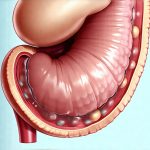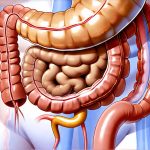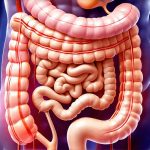Digestive discomfort is an incredibly common experience, ranging from mild bloating and gas to more persistent issues like heartburn, constipation, or diarrhea. Often, we attribute these problems to specific foods or isolated incidents, but the truth is that our daily habits play a massive role in how well (or poorly) our digestive systems function. A healthy gut isn’t just about what you eat; it’s about how you live – your routines, stress levels, movement patterns, and even how mindfully you approach mealtimes. Many people seek quick fixes for digestive issues, but lasting comfort often comes from integrating small, consistent changes into everyday life that support the natural processes of digestion.
This isn’t about restrictive diets or complicated regimens; it’s about building a lifestyle that nurtures your gut health and minimizes disruption to its delicate ecosystem. Think of your digestive system as a complex machine – regular maintenance and mindful operation are key to keeping it running smoothly. Ignoring these fundamentals can lead to chronic discomfort, reduced nutrient absorption, and even impact overall well-being. Cultivating habits focused on digestion isn’t merely about alleviating symptoms; it’s an investment in long-term health and vitality. You can begin by exploring daily habits to support enzyme efficiency.
The Foundation: Hydration & Mindful Eating
Hydration is arguably the most fundamental aspect of digestive comfort. Water is essential for breaking down food, moving waste through the digestive tract, and preventing constipation. Many people underestimate how much water they actually need, often confusing thirst with hunger. Aiming for at least eight glasses a day is a good starting point, but individual needs vary based on activity level, climate, and overall health. Consider incorporating hydrating foods like cucumbers, watermelon, and celery into your diet as well. Staying adequately hydrated isn’t just about drinking water when you feel thirsty; it’s about making it a consistent habit throughout the day. Prioritizing hydration can also contribute to gut peace.
Mindful eating is another cornerstone of digestive health. In today’s fast-paced world, we often eat on the go, while distracted, or even while working. This can lead to poor chewing, overeating, and ultimately, digestive distress. Mindful eating involves paying attention to your body’s hunger and fullness cues, savoring each bite, and creating a calm and relaxed atmosphere for mealtimes. It’s about disconnecting from distractions – turning off the TV, putting away your phone – and focusing solely on the experience of eating.
- Slow down your eating pace.
- Chew food thoroughly (aim for 20-30 chews per bite).
- Pay attention to texture, flavor, and aroma.
- Stop when you feel comfortably full, not stuffed.
- Avoid eating large meals before bed.
These simple practices can significantly improve digestion by giving your body the time it needs to properly break down food and absorb nutrients. It’s also about cultivating a healthier relationship with food itself – moving away from guilt or restriction towards mindful enjoyment. Consider incorporating best smoothies into your routine to support digestive enzyme activity.
The Power of Movement & Posture
Regular physical activity is vital for overall health, but its impact on digestive function is often overlooked. Exercise helps stimulate the muscles in your digestive tract, promoting peristalsis (the wave-like contractions that move food along). Even a gentle walk after meals can aid digestion and reduce bloating. Consistent movement doesn’t necessarily mean intense workouts; it could be anything from yoga or Pilates to dancing or gardening. The key is to find activities you enjoy and incorporate them into your routine.
Posture also plays a surprising role in digestive comfort. Slouching compresses the abdominal organs, hindering digestion and potentially leading to heartburn or constipation. Maintaining good posture – sitting up straight with shoulders relaxed – allows for optimal organ function and improved blood flow. This is especially important during mealtimes; avoid eating while hunched over or reclining immediately after eating.
Consider these points:
– Aim for at least 30 minutes of moderate-intensity exercise most days of the week.
– Incorporate movement breaks throughout the day, even if it’s just stretching or walking around.
– Practice good posture while sitting and standing.
– Avoid prolonged periods of sitting without moving.
Stress Management & Gut Health Connection
The gut and brain are intricately connected via what’s known as the gut-brain axis. This bidirectional communication system means that stress can significantly impact digestive function, and vice versa. When you’re stressed, your body releases cortisol, a hormone that can disrupt digestion, slow down bowel movements, and even contribute to inflammation in the gut. Chronic stress can exacerbate existing digestive issues or lead to new ones.
Managing stress is therefore crucial for maintaining digestive comfort. There are numerous effective stress-reduction techniques available:
– Deep breathing exercises
– Meditation or mindfulness practices
– Yoga or Tai Chi
– Spending time in nature
– Engaging in hobbies you enjoy
– Socializing with loved ones
Finding what works best for you is key. The goal isn’t to eliminate stress entirely (that’s unrealistic), but rather to develop healthy coping mechanisms that minimize its impact on your digestive system and overall well-being. Prioritizing self-care and incorporating regular relaxation techniques into your routine can make a world of difference. For those with sensitive systems, remember small wins truly matter.
Fiber Intake & Gut Microbiome Support
Fiber is an indigestible carbohydrate that plays a vital role in digestive health. It adds bulk to stool, promoting regularity and preventing constipation. There are two main types of fiber: soluble and insoluble. Soluble fiber dissolves in water, forming a gel-like substance that helps lower cholesterol and regulate blood sugar levels. Insoluble fiber doesn’t dissolve in water but adds bulk to stool, aiding in its passage through the digestive tract. A balanced intake of both types is essential for optimal gut health.
Beyond simply preventing constipation, fiber also serves as food for the beneficial bacteria in your gut – collectively known as the gut microbiome. A healthy gut microbiome is crucial for digestion, immune function, and even mental well-being. Supporting your gut microbiome through a fiber-rich diet can improve overall digestive comfort and reduce inflammation. Good sources of dietary fiber include:
– Fruits (berries, apples, bananas)
– Vegetables (broccoli, spinach, carrots)
– Whole grains (oats, quinoa, brown rice)
– Legumes (beans, lentils)
– Nuts and seeds
Gradually increase your fiber intake to avoid bloating or gas. Also, remember to drink plenty of water, as fiber absorbs water and can worsen constipation if you’re dehydrated. Consider incorporating fermented foods like yogurt, kefir, sauerkraut, or kimchi into your diet – these are rich in probiotics, which further support a healthy gut microbiome. Remember to also consider vegetables that support digestive health as part of a balanced intake. Be mindful of habits that harm pancreatic and enzymatic function to promote optimal digestion. Finally, remember regular bowel rhythm is important for overall health!


















